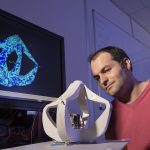Christian Duriez ©Inria / Photo C. Morel
Christian Duriez, Inria researcher leading the DEFROST team in Lille, is currently spending 6 months in the Collaborative Haptics and Robotics in Medicine (CHARM) Lab at Stanford University, supported by a Fulbright fellowship.
He tells us about his work and the collaboration with his California partner.
-
Christian, what is your field of research?
Software for deformable robotics: Our team (DEFROST) is proposing a new approach for modeling, simulation and control of robots that deforms to create their motion. These robots are also called « soft robots ».
-
You arrived in February in the Collaborative Haptics and Robotics in Medicine (CHARM) Lab, at Stanford University, for a 6-month research stay: for how long have you been working together? On what project are you currently working on?
The collaboration with the CHARM lab is wonderful. They have an amazing background in designing robots for haptic, tactile or surgical applications. Today they also design new kinds of soft robots with brillant ideas. On the other side, the team DEFROST brings the background on modeling, simulation and control of deformable robots.
We have started to work in September with Margaret Koehler who stayed 6 months in our team in France (see related interview here). The focus was on new approaches for soft haptic devices. We have worked on theoretical and software aspects, and when Margaret will be back in a few days, we will work on the design and the realization of a first prototype.
I am also involved in a project about soft growing robot (https://news.stanford.edu/2017/07/19/stanford-researchers-develop-new-type-soft-growing-robot/) that has been designed by the CHARM lab. We will use the simulation toolbox developed by DEFROST to reproduce the behavior of the robot in its environment. The main targeted application is search and rescue scenarios, and we want to evaluate several design possibilities.
-
What do you expect from this collaboration and what would be the next step?
This collaboration is a very good occasion to test our modeling and software tools in concrete applications. We will understand better the needs of the people who design soft robots and will make adaptations of our software to focus on the main challenges. We have here a great opportunity for the diffusion of the tools that we are developing.
I also expect to understand better how the research is led here, and also improve my english!
-
You obtained a “Fulbright Fellowship for Researchers » to support your stay in the CHARM Lab: what does it bring you and what advice would you give to prospective applicants?
I would highly recommend to go through the Fulbright program for such a stay in the US: not only for the financial support but also for their big help regarding the visa and all the administrative tasks…
This is for me a good opportunity to thank the people who work at Fulbright and who were very friendly and helpful for the preparation of my stay here. I would also like to thank my home region, the Haut-de-France, who funded a part of my project through Fulbright.
Interview by Tania Castro for Inria@SiliconValley
Bio

© Inria / Photo H. Raguet
Christian Duriez received his engineering degree from the Institut Catholique d’Arts et Métiers of Lille (France) and a PhD degree in robotics from CEA List & University of Evry (France) followed by a postdoctoral position at the CIMIT SimGroup in Boston. Christian joined Inria in 2006 in the ALCOVE team to work on interactive simulation of deformable objects and haptic rendering. In 2009, he became the vice-head of the SHACRA team focusing on medical simulation. Christian is now the head of the DEFROST team, created in January 2015 . His research topics are Soft Robot models and control, Fast Finite Element Methods, simulation of contact response and other complex mechanical interactions, new algorithms for haptics… All his research results are developed in SOFA, which is a framework that was co-develop with other Inria teams. Christian was also part of the founders of the start-up company InSimo which uses those research results for a fantastic humanitarian project (see the proof of concept) !
Related articles:
- Margaret Koehler, PhD student from Stanford, awarded Chateaubriand fellowship for a 6-month internship in the DEFROST Inria Team
- Fulbright Fellowships for French PhD students and Researchers
- About Inria DEFROST team
- About CHARM Lab